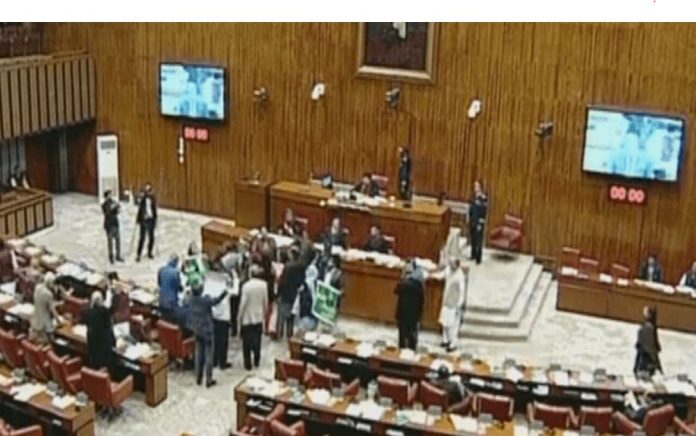ISLAMABAD, DEC 12: The Senate on Monday passed the Foreign Investment Promotion and Protection Bill, 2022 — paving the way for the reconstitution of a Reko Diq mining project — amid protests by PTI legislators over the “illegal arrest” of detained party leader Azam Swati.
Chants of “Release Azam Swati” and “issue production orders” reverberated through the house as protesting PTI legislators gathered around Senate Chairman Sadiq Sanjrani’s podium and registered their protest, while Law Minister Azam Nazeer Tarar presented the proposed law.
Earlier this week, the apex court declared the revival of the Reko Diq project legal and stated that the proposed Foreign Investment (Protection and Promotion) Bill, 2022 and any amendments to it would not violate the Constitution or the law, provided that the relevant resolutions were passed by the Sindh and Balochistan Assemblies and the National Assembly after following due procedure.
At the outset of the session today, Tarar presented the draft law which was a part of the Senate’s supplementary agenda.
In a brief speech that was interrupted by protests, the minister said that foreign investment was very important for the country to progress. “It is in everyone’s knowledge that the Reko Diq project came to a halt […] because of which Pakistan suffered several fines.”
While Tarar spoke, a flustered Sanjrani repeatedly asked PTI senators — who had gathered around the minister — to take their seats.
“We will pass the production orders [of Azam Swati]. Don’t disrupt the quorum of the session,” he said, as PTI legislators continued to chant slogans.
Sanjrani asked the house members if they had any objections to the bill. At this, PPP Senator Raza Rabbani and National Party’s Tahir Bizenjo raised their hands in objection to the law.
However, the legislation still went through as Senate chairman said that the “Foreign Investment Promotion and Protection Bill, 2022, is adopted” and adjourned the session till Thursday.
Today’s session was summoned by President Dr Arif Alvi under Article 54 of the Constitution after the upper house of the parliament last met on October 21.
Reko Diq deal
The original agreement for the Reko Diq mining project was signed in 2006, and it set aside a share of 37.5pc to Canada’s Barrick Gold and Chile’s Antofagasta each while the Balochistan government received a 25pc stake.
The two international firms were part of the consortium Tethyan Copper company and had found vast gold and copper deposits at Reko Diq in Balochistan.
But the hugely lucrative open-pit mine project came to a standstill in 2011 after the local government refused to renew Tethyan Copper’s lease, and in 2013 Supreme Court declared it invalid.
In 2019, the World Bank’s arbitration tribunal committee imposed a penalty on Pakistan for unlawful denial of mining.
However, in March, the federal and Balochistan governments reached an agreement with two international firms — Antofagasta PLC and Barrick Gold Corporation — on a framework to reconstitute the Reko Diq project that allowed Antofagasta to make an exit.
The reconstituted project, which will excavate gold and copper reserves in Balochistan, saved Pakistan from an $11 billion penalty in the Reko Diq case.
Under the new agreement, Barrick decided to become a 50 per cent partner with the governments of Pakistan and Balochistan and three state-owned entities in the project, while the Chilean firm exited the contract in exchange for $900 million by Pakistani shareholders.
Balochistan government holds a 25pc stake in the project under the new pact and the rest of the 25pc shareholding is controlled equally (8.33pc) by the three state-owned enterprises.
On October 18, President Dr Arif Alvi moved a reference seeking the apex court’s opinion on the proposed reconstitution of Reko Diq project in Balochistan and interpretation on whether its 2013 judgement in the case prevented the federal and provincial governments from entering into the implementation agreement and the constitutionality of the proposed Foreign Investment (Protection and Promotion) Bill 2022.

















